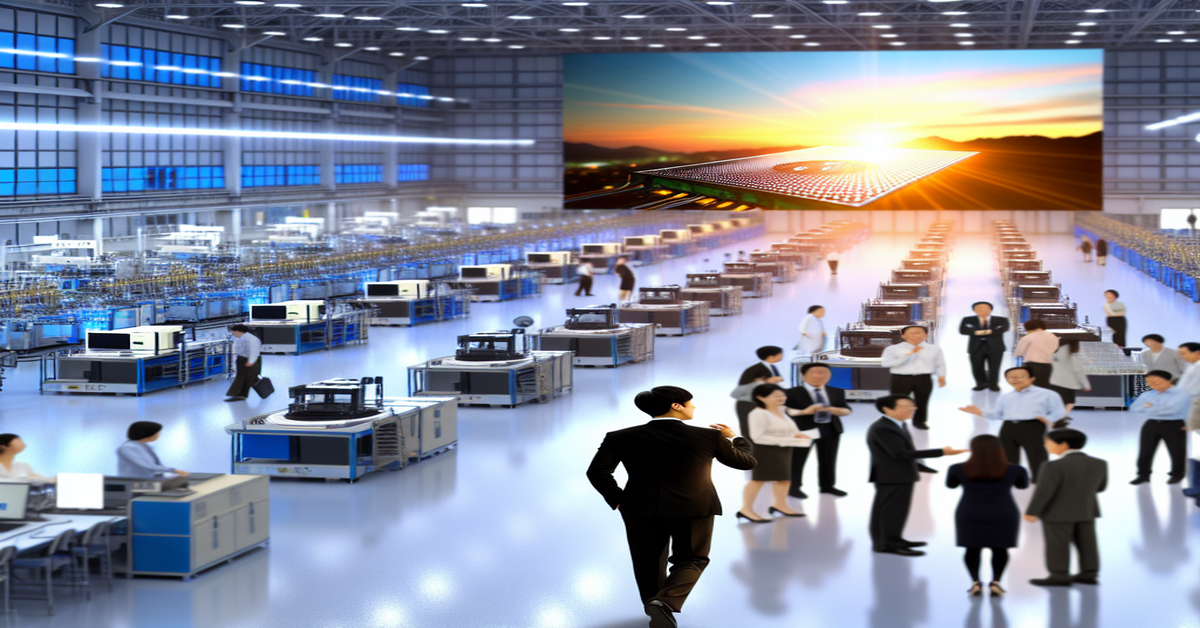Sam Altman’s Visit to Korea: Navigating the Intersection of AI and Semiconductor Technology
In a world where technological advancements are rapidly reshaping industries and economies, the recent visit of Sam Altman, CEO of OpenAI, to Korea has sparked significant interest and speculation. As the developer of the groundbreaking ChatGPT, OpenAI has been at the forefront of artificial intelligence (AI) innovation, captivating audiences worldwide with its powerful language models and vast potential applications.
Altman’s presence in Korea comes at a time when the country is grappling with **controversies** surrounding its semiconductor policies and the broader implications of technological progress. The semiconductor industry has long been a pillar of Korea’s economy, with giants like Samsung and SK Hynix playing a crucial role in the global market. However, the rapid pace of innovation and the increasing competition from other nations have put pressure on Korea to adapt and maintain its competitive edge.
The Intersection of AI and Semiconductors
The convergence of AI and semiconductor technology is a fascinating area that holds immense promise for the future. As AI systems become more sophisticated and demanding, they require advanced hardware to support their computations. This is where the semiconductor industry comes into play, developing cutting-edge chips and processors that can handle the complex algorithms and massive datasets involved in AI applications.
OpenAI’s work in developing powerful AI models like ChatGPT has highlighted the need for robust infrastructure and specialized hardware. The company’s visit to Korea could signal a potential collaboration or investment in the country’s semiconductor industry, leveraging the expertise and resources of Korean firms to further advance AI capabilities.
Implications for Korea’s Tech Industry
Sam Altman’s visit to Korea is not just a casual trip; it carries significant weight for the country’s tech industry. As a pioneer in AI development, OpenAI’s presence could open up new opportunities for Korean companies to partner with the Silicon Valley giant and explore innovative applications of AI technology.
Moreover, the discussions and interactions between Altman and Korean officials, industry leaders, and academics could shape the future direction of AI research and development in the country. By exchanging ideas and insights, both parties can gain valuable knowledge and explore potential synergies that could drive technological progress forward.
Economic and Technological Strategies
The implications of Altman’s visit extend beyond the tech industry itself. As Korea grapples with the challenges posed by the evolving technological landscape, the country must adapt its economic and technological strategies to remain competitive on the global stage.
The semiconductor industry, in particular, faces intense pressure from rivals like Taiwan and China, who are investing heavily in their own chip manufacturing capabilities. Korea must find ways to differentiate itself and maintain its edge in this crucial sector, while also exploring new avenues for growth and innovation.
The potential collaboration between OpenAI and Korean entities could provide a boost to the country’s AI ecosystem, attracting talent, investment, and research opportunities. By leveraging the expertise and resources of both parties, Korea could position itself as a hub for AI innovation, driving economic growth and technological advancement.
Navigating the Controversies
Of course, the path forward is not without its challenges and controversies. The rapid pace of technological change has raised concerns about job displacement, ethical considerations, and the societal impact of AI. Korea, like many other nations, must grapple with these issues and find ways to balance innovation with responsible development and deployment of AI technologies.
The semiconductor industry itself is not immune to controversies, with geopolitical tensions and trade disputes affecting global supply chains and market dynamics. Korea must navigate these challenges carefully, seeking to maintain its competitive position while also fostering international collaboration and cooperation.
Looking to the Future
As we look to the future, the intersection of AI and semiconductor technology holds immense potential for transforming industries, economies, and societies. Sam Altman’s visit to Korea is a testament to the growing importance of this convergence and the opportunities it presents for nations and companies alike.
Korea, with its strong foundation in the semiconductor industry and its growing AI ecosystem, is well-positioned to play a leading role in this technological revolution. By embracing innovation, fostering collaboration, and addressing the challenges and controversies head-on, the country can chart a path towards a thriving and sustainable future.
The coming years will be crucial for Korea as it navigates the rapidly evolving technological landscape. The decisions made today will shape the country’s economic and technological trajectory for decades to come. By seizing the opportunities presented by AI and semiconductor technology, and by working closely with visionary leaders like Sam Altman and OpenAI, Korea can position itself at the forefront of the digital age, driving progress and prosperity for its citizens and the world at large.
#AI #Semiconductors #TechInnovation #KoreaTech #OpenAI
-> Original article and inspiration provided by Opahl Technologies
-> Connect with one of our AI Strategists today at Opahl Technologies


